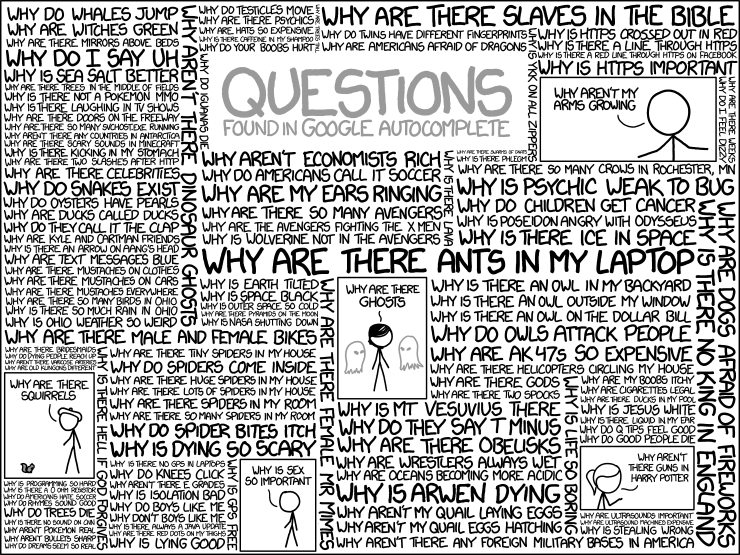I invite you to ask anything you’re wondering about that’s remotely related to effective altruism. There’s no such thing as a question too basic.
Try to ask your first batch of questions by Monday, October 17 (so that people who want to answer questions can know to make some time around then).
Everyone is encouraged to answer (see more on this below). There’s a small prize for questions and answers. [Edit: prize-winning questions and answers are announced here.]
This is a test thread — we might try variations on it later.[1]
How to ask questions
Ask anything you’re wondering about that has anything to do with effective altruism.
More guidelines:
- Try to post each question as a separate "Answer"-style comment on the post.
- There’s no such thing as a question too basic (or too niche!).
- Follow the Forum norms.[2]
I encourage everyone to view asking questions that you think might be “too basic” as a public service; if you’re wondering about something, others might, too.
Example questions
- I’m confused about Bayesianism; does anyone have a good explainer?
- Is everyone in EA a utilitarian?
- Why would we care about neglectedness?
- Why do people work on farmed animal welfare specifically vs just working on animal welfare?
- Is EA an organization?
- How do people justify working on things that will happen in the future when there’s suffering happening today?
- Why do people think that forecasting or prediction markets work? (Or, do they?)
How to answer questions
Anyone can answer questions, and there can (and should) be multiple answers to many of the questions. I encourage you to point people to relevant resources — you don’t have to write everything from scratch!
Norms and guides:
- Be generous and welcoming (no patronizing).
- Honestly share your uncertainty about your answer.
- Feel free to give partial answers or point people to relevant resources if you can’t or don’t have time to give a full answer.
- Don’t represent your answer as an official answer on behalf of effective altruism.
- Keep to the Forum norms.
You should feel free and welcome to vote on the answers (upvote the ones you like!). You can also give answers to questions that already have an answer, or reply to existing answers, especially if you disagree.
The (small) prize
This isn’t a competition, but just to help kick-start this thing (and to celebrate excellent discussion at the end), the Forum team will award $100 each to my 5 favorite questions, and $100 each to my 5 favorite answers (questions posted before Monday, October 17, answers posted before October 24).
I’ll post a comment on this post with the results, and edit the post itself to list the winners. [Edit: prize-winning questions and answers are announced here.]

- ^
Your feedback is very welcome! We’re considering trying out themed versions in the future; e.g. “Ask anything about cause prioritization” or “Ask anything about AI safety.”
We’re hoping this thread will help get clarity and good answers, counter some impostor syndrome that exists in the community (see 1 and 2), potentially rediscover some good resources, and generally make us collectively more willing to ask about things that confuse us.
- ^
If I think something is rude or otherwise norm-breaking, I’ll delete it.

Note that unilaterally using gene drives in this way is usually considered a really bad idea because of poisoning the well against further use. Not just by usual conservative bioethics types, but by the scientist who first proposed using CRISPR to affect wild populations like mosquitos:
"Esvelt, whose work helped pave the way for Target Malaria’s efforts, is terrified, simply terrified, of a backlash between now and then that could derail it. This is hardly a theoretical concern. In 2002, anti-GMO hysteria led the government of Zambia to reject 35,000 tons of food aid in the middle of a famine out of fear it could be genetically modified. Esvelt knows that the CRISPR gene drive is a tool of overwhelming power. If used well, it could save millions of lives, help rescue endangered species, even make life better for farm animals.
If used poorly, gene drives could cause social harms that are difficult to reverse. What if gene drives get a bad rap? What if an irresponsible scientist moves too fast and prompts a strong political countermovement, like that which has stymied other genetically modified organisms since the 1990s? What if an irresponsible journalist — let’s call him Dylan Matthews — writes a bad article that misconstrues the issue and sends the project off the rails?
“To the extent that you or I say something or publish something that reduces the chance that African nations will choose to work with Target Malaria by 1 percent, thereby causing a 1 percent chance that project will be delayed by a decade, the expected cost of our action is 25,000 children dead of malaria,” Esvelt tells me. “That’s a lot of kids.”"